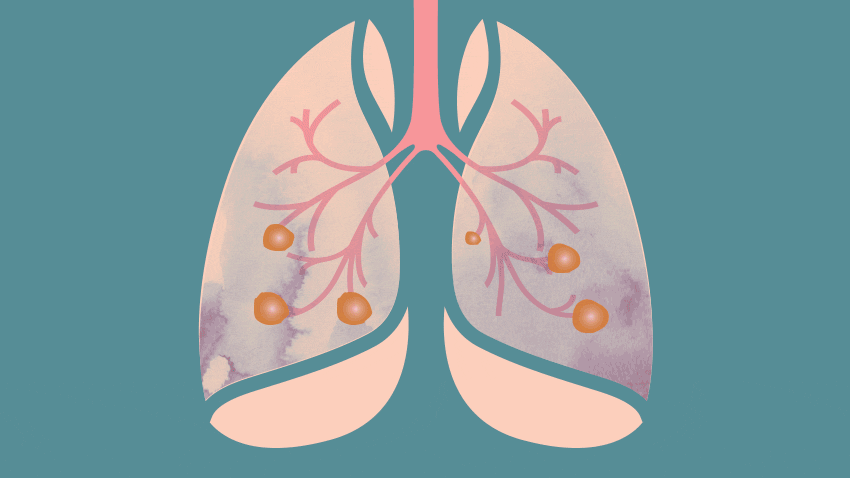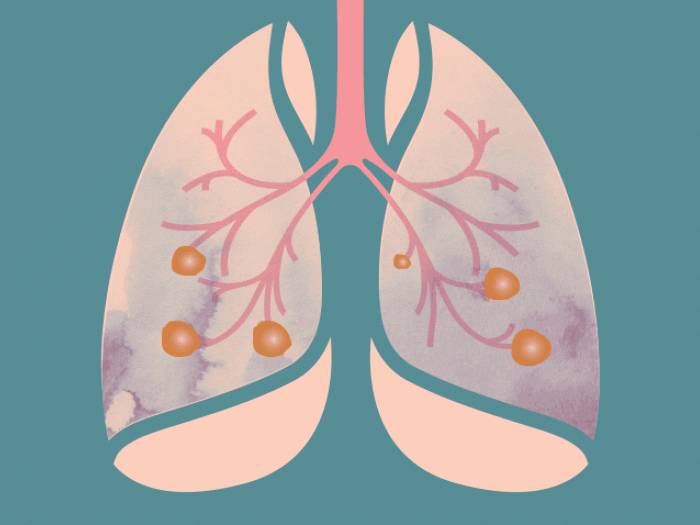A large randomized trial finds Keytruda given with chemotherapy resulted in 20 percent improved survival at one year.
12:00 PM
Author |

Results from a new study will likely change the standard of care for advanced lung cancer.
MORE FROM THE LAB: Subscribe to our weekly newsletter
In the first large, randomized trial to look at immunotherapy as a first-line cancer treatment, researchers found that adding the immunotherapy drug pembrolizumab to chemotherapy for advanced lung cancer led to better tumor control and overall survival than chemotherapy followed by pembrolizumab.
The phase 3 KEYNOTE-189 trial enrolled 616 patients with metastatic non-small cell lung cancer. Patients who received pembrolizumab (Keytruda) with chemotherapy had improved duration of tumor control and improved overall survival. At one year, 69 percent of the patients who received pembrolizumab and chemotherapy were alive, compared with 49 percent of the patients who received chemotherapy alone.
On average, the study found, cancer was controlled for almost nine months in patients who received pembrolizumab with chemotherapy, compared with five months in patients who received chemotherapy and a placebo. Also, tumor shrinkage of at least 30 percent was observed in 48 percent of the patients who received pembrolizumab with chemotherapy; it was 19 percent in patients who received chemotherapy alone.
Results will be presented at the American Association for Cancer Research annual meeting and published in the New England Journal of Medicine.
A win for immunotherapy
Immunotherapy attempts to activate the patient's immune system to fight cancer. This is the first time an immunotherapy drug has been combined with first-line chemotherapy to treat nonsquamous non-small cell lung cancer, which constitutes 85 percent of all lung cancers.
"We've never seen these types of results in patients with advanced lung cancer. To have patients who have not had any progression of cancer and are not receiving any treatment is truly remarkable," says Shirish M. Gadgeel, MBBS, Mary Lou Kennedy Research Professor in Thoracic Oncology at the University of Michigan Rogel Cancer Center.
Gadgeel serves on the steering committee for KEYNOTE-189 and participated with a global team on two prior studies. He discusses the trial results and what it means for lung cancer patients.
Could you share examples of patients who have benefited from combining pembrolizumab and chemotherapy?
Gadgeel: Yes, one patient in her late 50s was diagnosed with stage 4 adenocarcinoma of the lung that had metastasized to both lungs. I met her in May 2014 and talked with her about the KEYNOTE-21 trial. This trial evaluated the safety and efficacy of adding pembrolizumab to chemotherapy and laid the foundation for the KEYNOTE-189 trial. She was skeptical initially, but subsequently agreed to participate. She started on chemotherapy with pembrolizumab, and within two months her scans showed almost complete resolution of her cancer. Treatment continued every three weeks and stopped in May 2016, according to protocol.
Since then, she has been followed with regular scans, and there is no evidence of cancer progression.
It has been about four years since her diagnosis of stage 4 lung cancer; she is doing very well and has not received any treatment for two years.
In another example, in August 2014, I met another woman in her early 50s who enrolled in the study. She received treatment with pembrolizumab and chemotherapy until December 2015. At that time, she stopped treatment because she was experiencing periods of fatigue. Over the last two years, she has not received any therapy for the cancer. Her scans showed almost complete clearance of the cancer, and there has been no evidence of any progression of cancer. She continues to work, although she has days of fatigue that she did not experience before she went on this treatment.
We've never seen these types of results in patients with advanced lung cancer.Shirish M. Gadgeel, MBBS
What was the most amazing part of these results?
Gadgeel: As a physician who has had the privilege of taking care of lung cancer patients for 18 years, I remain amazed that I had a stage 4 lung cancer patient who is not only alive after almost four years, but also that this patient is not receiving any treatment at the present time and does not have any clear evidence of cancer in her scans. There are other patients who have had similar prolonged benefits. I believe her case exemplifies the potential of immunotherapy — although such sustained benefits were observed only in a proportion of the patients treated on the trial.
As lung cancer doctors, we hope that we can extend the benefits of such therapy to many more lung cancer patients.
What were the side effects of pembrolizumab in KEYNOTE-189?
Gadgeel: Patients receiving pembrolizumab experienced immune-related side effects. These immune-related side effects can occur as a result of the activated immune system attacking a variety of organs, including the lungs, heart, colon and thyroid. Although in most instances the side effects are tolerable and can be managed effectively, rarely patients can die from such side effects.
In Keynote-189 only few adverse events were more common in patients who received pembrolizumab with chemotherapy as compared to patients who received chemotherapy alone. These were diarrhea, rash and kidney injury. Adverse events led to the discontinuation of treatment in 14 percent of the patients who received pembrolizumab with chemotherapy, whereas it was 8 percent among patients who received chemotherapy.
What is the next step for the research?
Gadgeel: Several research efforts are ongoing at the Rogel Cancer Center to understand why only some patients benefit from this treatment strategy and others don't. Also, we are currently conducting clinical trials testing experimental drugs that may be effective in patients who don't benefit from drugs like pembrolizumab, or after deriving benefit experience cancer progression. Such research may help extend the benefits of immunotherapy to patients who will not benefit from the addition of pembrolizumab with first-line chemotherapy.
Disclosure: Gadgeel was compensated for participating in advisory boards organized by Roche/Genentech, Takeda, AstraZeneca and AbbVie.
Learn more about lungt cancer and lung cancer treatment at the U-M Rogel Cancer Center

Explore a variety of health care news & stories by visiting the Health Lab home page for more articles.

Department of Communication at Michigan Medicine
Want top health & research news weekly? Sign up for Health Lab’s newsletters today!





